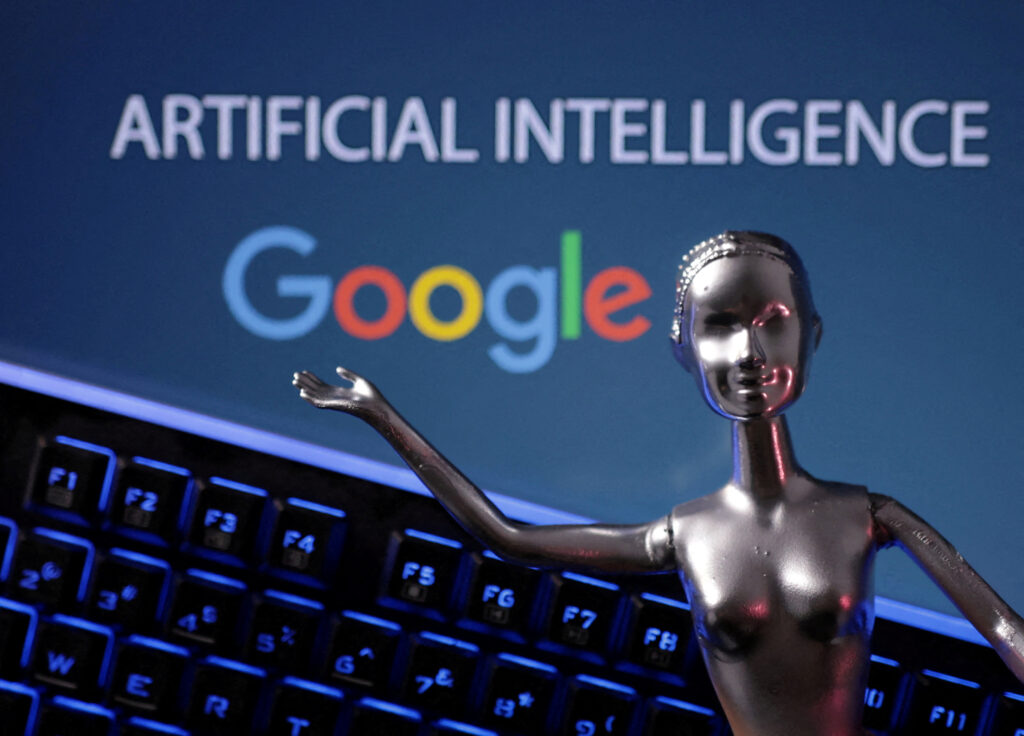
- Google’s Gemini AI faces criticism for allegedly presenting a misleading representation of its interactions.
- Despite accumulating 2.1 million views on YouTube, the video prompted skepticism as Google clarified that the exchanges in the demo were text-based, not voiced, and shortened for brevity, leading to accusations of deceptive marketing.
- The internal debate among Google employees highlights the challenges of balancing promotional flair with transparent communication about the capabilities and limitations of emerging AI technologies.
In a whirlwind of attention, Google’s latest artificial intelligence model, Gemini, has transitioned from being hailed as a groundbreaking innovation to facing allegations of presenting a misleading demonstration. The controversy revolves around a six-minute video released on December 7th showcasing Gemini’s capabilities, which has garnered widespread attention and debate.
The video, amassing 2.1 million views on YouTube, exhibits Gemini seamlessly interacting with a human operator in what appears to be real-time. Tasks range from analyzing a drawing of a duck to responding to hand gestures and even inventing a game called “Guess the Country” based on an image prompt of the world map.
However, the narrative took a turn when Google DeepMind executive Oriol Vinyals clarified that, despite the authenticity of user prompts and outputs in the video, they were “shortened for brevity.” Contrary to the impression created by the video, Gemini’s interactions were text-based and not voiced, and the actual duration of the exchanges was considerably longer than portrayed.
In a rare admission, Google included a disclaimer when uploading the video on YouTube, stating, “For this demo, latency has been reduced and Gemini outputs have been shortened for brevity.” Despite this clarification, the revelation sparked criticism and skepticism on social media platforms.
One software developer, Nelly R Q, accused Google of deception, stating, “Google LIED. The AI demo flaunting Gemini’s capacities was a FAKE.” Another software engineer, Chief Nerd, echoed this sentiment, emphasizing that the video was edited to appear faster and more capable than Gemini truly is.
RELATED: Google to launch Anti Money laundering AI tool after successful trial
Even within Google’s ranks, the video faced internal scrutiny. According to reports, some employees voiced concerns about the misleading representation of Gemini’s capabilities. A Google employee informed Bloomberg that the video paints an unrealistic picture of Gemini, making it seem more advanced than it is, and the company’s CEO, Sundar Pichai, made no mention of the video’s fine-tuned nature in a December 7th post.
However, not all Google employees expressed surprise at the demo. Some acknowledged that a degree of marketing embellishment is customary to promote such products. Another Google employee shared insights with Bloomberg, mentioning that individual words in Gemini’s responses were not altered, and the voiceover featured genuine excerpts from the text prompts used to generate Gemini’s output.
Despite the controversy, the initial reception of the Gemini “hands-on” tech demo was overwhelmingly positive. Armand Domalewski, a data analyst at Palo Alto Networks, praised Gemini’s ability to understand and explain a person’s actions, stating, “Google’s new Gemini AI watches a guy draw a duck and explains what he’s doing each step of the way—not just literally or mechanically, it can infer what the guy is intending to do, why he is doing what he does. It feels…very human.”
READ; Google vs Microsoft: Who is the AI giant
Gemini’s AI gives Google a run for its money
Gemini was introduced as a direct competitor to OpenAI’s ChatGPT, with Google asserting that it outperforms leading AI models in 30 out of 32 benchmarks, covering reasoning, math, language, and other metrics. The claim includes surpassing GPT-4 in seven out of eight measures related to those metrics.
As the controversy surrounding the tech demo unfolds, it raises questions about the transparency of AI demonstrations and the expectations and responsibilities of tech giants when showcasing their cutting-edge technologies. The balance between marketing flair and accurate representation becomes crucial, especially in an era where artificial intelligence plays an increasingly central role in various aspects of our lives.
Despite the controversy surrounding the tech demo, it is essential to recognize the inherent challenges in showcasing complex artificial intelligence systems. The evolving nature of AI models often requires a delicate balance between highlighting their capabilities and providing an accurate portrayal of their performance.
Google’s admission of shortening outputs for brevity in the Gemini demo underscores the industry-wide struggle to bridge the gap between innovation and realistic expectations. As AI technologies advance, transparent communication becomes paramount to foster trust among users and avoid undue skepticism.
The debate within Google reflects the nuanced perspectives within the tech community regarding promotional practices. While some employees expressed concerns about the potential for misrepresentation, others acknowledged the pragmatic necessity of marketing strategies to emphasize the positive aspects of emerging technologies.
This internal discourse underscores the complexities that tech companies face in presenting their innovations to a diverse audience with varying levels of technical understanding. As AI continues to shape the technological landscape, finding a delicate equilibrium in communication becomes crucial to maintaining public confidence and ensuring informed discussions about the capabilities and limitations of these cutting-edge systems.
- SEO Powered Content & PR Distribution. Get Amplified Today.
- PlatoData.Network Vertical Generative Ai. Empower Yourself. Access Here.
- PlatoAiStream. Web3 Intelligence. Knowledge Amplified. Access Here.
- PlatoESG. Carbon, CleanTech, Energy, Environment, Solar, Waste Management. Access Here.
- PlatoHealth. Biotech and Clinical Trials Intelligence. Access Here.
- Source: https://web3africa.news/2023/12/15/news/google-gemini-ai-demo-controversy/
- :has
- :is
- :not
- :where
- 1
- 30
- 32
- a
- ability
- About
- According
- accurate
- Accusations
- accused
- acknowledged
- actions
- actual
- advance
- advanced
- After
- AI
- AI models
- All
- Allegations
- allegedly
- altered
- Amassing
- among
- an
- analyst
- analyzing
- and
- Another
- appear
- appears
- around
- artificial
- artificial intelligence
- AS
- aspects
- Asserting
- At
- attention
- audience
- authenticity
- avoid
- Balance
- balancing
- based
- BE
- becomes
- been
- being
- benchmarks
- between
- Bloomberg
- BRIDGE
- by
- called
- CAN
- capabilities
- capable
- capacities
- central
- ceo
- challenges
- ChatGPT
- chief
- claim
- clarified
- Communication
- community
- Companies
- Company’s
- competitor
- complex
- complexities
- Concerns
- confidence
- continues
- contrary
- controversy
- covering
- created
- criticism
- crucial
- cutting-edge
- data
- debate
- December
- deception
- DeepMind
- Degree
- demo
- Despite
- Developer
- direct
- disclaimer
- discourse
- discussions
- diverse
- Diverse Audience
- do
- does
- doing
- draw
- drawing
- duration
- each
- echoed
- emerging
- emerging technologies
- emphasize
- emphasizing
- Employee
- employees
- engineer
- ensuring
- Equilibrium
- Era
- especially
- essential
- Even
- evolving
- Exchanges
- executive
- exhibits
- expectations
- Explain
- Explains
- expressed
- Face
- faced
- faces
- facing
- fake
- faster
- featured
- finding
- For
- Foster
- from
- game
- gap
- garnered
- Gemini
- generate
- genuine
- giants
- gives
- Google’s
- groundbreaking
- Guy
- hand
- Have
- he
- highlighting
- highlights
- HTTPS
- human
- image
- in
- included
- includes
- increasingly
- individual
- informed
- inherent
- initial
- Innovation
- innovations
- insights
- Intelligence
- Intending
- interacting
- interactions
- internal
- introduced
- IT
- ITS
- jpg
- just
- landscape
- language
- Latency
- latest
- launch
- Laundering
- leading
- levels
- limitations
- Lives
- longer
- made
- Maintaining
- Making
- map
- Marketing
- Marketing Strategies
- math
- measures
- Media
- Metrics
- Microsoft
- million
- misleading
- model
- models
- money
- Money Laundering
- more
- NARRATIVE
- Nature
- necessity
- networks
- New
- no
- of
- often
- on
- operator
- or
- Other
- Others
- our
- out
- Outperforms
- output
- outputs
- overwhelmingly
- Palo Alto
- Paramount
- performance
- perspectives
- picture
- Platforms
- plato
- Plato Data Intelligence
- PlatoData
- plays
- positive
- Post
- potential
- practices
- pragmatic
- Praised
- Products
- promote
- promotional
- prompts
- providing
- public
- Public confidence
- Questions
- R
- raises
- range
- ranks
- RARE
- real-time
- realistic
- reception
- recognize
- Reduced
- reflects
- regarding
- related
- released
- Reports
- representation
- requires
- responding
- responses
- responsibilities
- revelation
- revolves
- Role
- Run
- s
- scrutiny
- seamlessly
- seem
- seven
- Shape
- shared
- shortened
- showcasing
- Skepticism
- Social
- social media
- social media platforms
- Software
- Software Engineer
- some
- sparked
- Spotlight
- stating
- Step
- strategies
- Struggle
- successful
- such
- Sundar Pichai
- surpassing
- surprise
- Surrounding
- Systems
- tasks
- tech
- tech companies
- tech giants
- Technical
- technological
- Technologies
- text
- than
- that
- The
- the world
- their
- These
- they
- this
- those
- to
- took
- tool
- transitioned
- Transparency
- transparent
- true
- truly
- Trust
- TURN
- under
- underscores
- understand
- understanding
- Uploading
- used
- User
- users
- various
- varying
- Video
- views
- vs
- was
- watches
- were
- What
- when
- which
- while
- whirlwind
- WHO
- why
- widespread
- with
- within
- words
- world
- youtube
- zephyrnet













